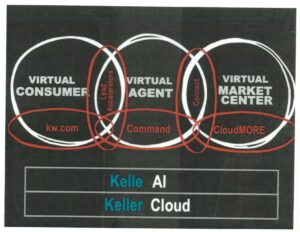With every industry comes innovation and, inevitably, disruption. Is technology disrupting real estate? Local experts Stewart Downey and Jeff Stewart say yes, but don’t despair – we can use it to our advantage both as real estate professionals and consumers.
Both Jeff and Stewart manage Keller Williams offices in a CEO role in the Asheville area. They are witnessing the “fourth industrial revolution” in real estate as technology and artificial intelligence (AI) transform the way we buy and sell property.
Tech and the industry’s evolution
A new industry goes through a period of creation with a large variety of players from small to large companies. Innovation or disruption is the next phase when a player not in the game that wants to take a share competes against a current player.
Technology began with hardware a computer or other device. Independent developers created software to drive the hardware. Then we introduced cloud storage as a supplement, created from a need for storage. All together, this is a commodity. For example, a smartphone combines hardware (the phone), software (the operating system and apps), and cloud storage.
The next wave is data powered by AI, curated like your Amazon suggestions based on search history. Since the real estate industry is slightly behind other industries, savvy experts were able to see what was going to happen and take ownership of automated systems. Agents and companies need to work with the tech or they will risk becoming obsolete.
The agent’s role
As an agent, will you use technology to your advantage or become the fiduciary of technology? It’s important to establish who’s in control of the best data and experience, so that consumers think of the agent first rather than an automated website.
Instead of fearing replacement by a robot, agents need to be proactive, leverage the tech and grow with it to succeed. There is no reason to fear it. But the usual pipeline of business flow, the experts say, is changing.
In the past, agents worked as little as possible in the virtual space. Now, they need to examine ways to serve at a higher level using that technology. Instead of transactional, agents need to offer a transformational experience.
Zillow and other technology disrupting real estate as we know it
Software companies in the real estate industry minimize the agent’s role – they become simply a door opener, so to speak. The most well-known software is Zillow, which dominates the virtual real estate market.
Even though their “zestimate” is not always accurate, the customer doesn’t always care. Their online portals are easy to navigate and accessible. How can a human agent compete? Essentially, Zillow forces agents to create value in order to flourish, Jeff says.
“Where do we create a value gap over a functionary position?”
Savvy agents see Zillow as a way to streamline the process and a chance to prove their skills as a valuable agent. Lazy agents will work for Zillow and become transactional. The competition doesn’t affect the cost to the consumer. Ultimately, companies like Zillow raise the level, forcing competitors to meet them or get out of the industry. However, we don’t want to see the same effects as what companies like Expedia did to travel agencies.
How to get the edge
Stewart and Jeff agree that whoever wins the customer experience will get ahead. But how to compete with Zillow? Well, you have to diversify and join the technology game. Develop, perfect and own your technology.
 With exclusive programs, companies need to connect the three key components – virtual agent, virtual market center/office, and virtual consumer. First, build a platform with data and AI. Brokerage firms have to own that and be able to connect to it. Both agents and consumers need portals and access points. All the components need to talk to each other and build on real data, create predictive analytics based on transactional data and metrics.
With exclusive programs, companies need to connect the three key components – virtual agent, virtual market center/office, and virtual consumer. First, build a platform with data and AI. Brokerage firms have to own that and be able to connect to it. Both agents and consumers need portals and access points. All the components need to talk to each other and build on real data, create predictive analytics based on transactional data and metrics.
For example, if customers want to refinance when rates drop, the AI should be able to tell the agent to reach out – or better yet, reach out automatically. This is an opportunity to make money and create a higher level of service. With systems streamlining the process, agents leverage AI to serve people better and transform the experience, thus making more money. It’s a win-win.
Is Keller Williams then becoming a technology company? Gary Keller is devoted to real estate and serving his agents, then said they are becoming a tech company. He is investing in tech to the benefit of all Keller Williams agents. This was a strategic statement on his part, Jeff says, and he’s setting a foundation to work with the best developers and resources.
Why does this matter to consumers? Stewart asserts that you want an expert, not a popular name. The agent needs to know what the consumer doesn’t, and Keller Williams allows them to look behind the curtain and access real data. By doing so, they can accurately see trends that Zillow only estimates. With the addition of personalized services and local insight, it’s a better experience overall.
To summarize: what’s happening and where are we going?
We’re in the phase of the real estate industry where we have market saturation. Technology is disrupting real estate as innovation grows. It’s almost a war over the customer experience. Agents need to decide whether to use the tech or be used by it.
At the end of the day, it’s a people business. We’re moving more into an artisan experience for the customer, with value that the automated company can’t bring. People are willing to pay more or seek out that quality, caring concierge experience at a high level, so agents need to create that for them.
Keller Williams experts are students of this process, hosting events and mastermind groups to share this information with business owners and agents. Contact Jeff or Stewart to learn more and stay on the cutting edge to avoid landing on the cutting room floor.
Jeff: [email protected] or call any local Keller Williams office to connect
Stewart: 252-269-4706, [email protected]




